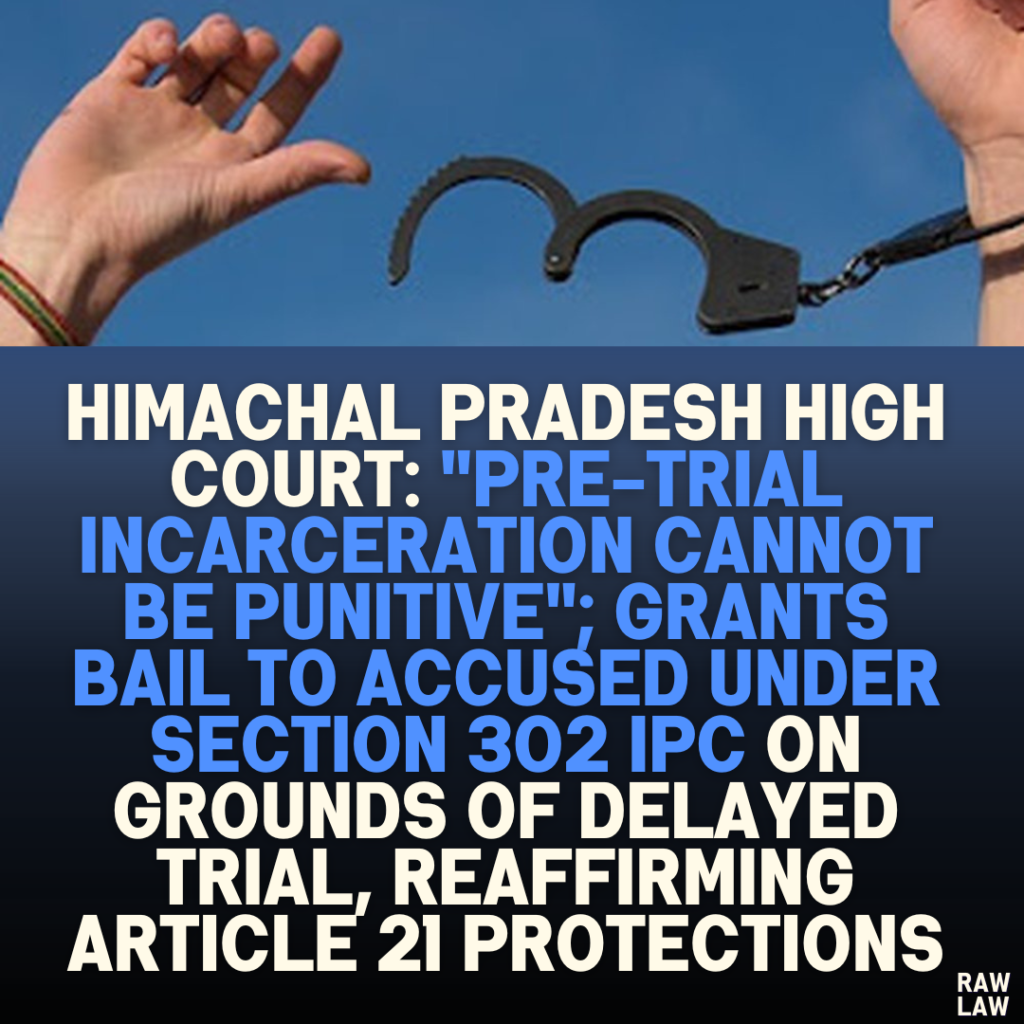Court’s Decision
The Himachal Pradesh High Court granted bail to the petitioner, accused under Sections 302 (Murder), 201 (Causing Disappearance of Evidence), and 120-B (Criminal Conspiracy) of the IPC. The court highlighted that pre-trial incarceration cannot be punitive and upheld the petitioner’s constitutional right to a speedy trial. The decision was based on the prolonged delay in the trial, during which the petitioner was in custody for over four years, and the absence of evidence suggesting that granting bail would prejudice the trial.
Facts
- Incident Background: The petitioner was accused of murdering a minor, Master Sandeep alias Sunny, on September 14, 2020. The minor allegedly witnessed the petitioner and a co-accused in a compromising situation. The minor’s body was recovered from fields on September 16, 2020. The FIR (No. 292/2020) was registered at Police Station Nalagarh, District Solan, Himachal Pradesh.
- Custody and Trial Progress: The petitioner was arrested on September 18, 2020, and had been in custody since then. Despite the lapse of over four years, only four of the 38 listed prosecution witnesses had been examined. This included key witnesses, such as the minor children of the co-accused.
- Co-Accused: The co-accused in the case had already been released on bail under similar circumstances.
Issues
- Right to Speedy Trial: Whether the prolonged delay in the trial infringed upon the petitioner’s constitutional right under Article 21.
- Grant of Bail: Whether the petitioner could be granted bail despite the seriousness of the charges and the risk of witness tampering.
Petitioner’s Arguments
- Unreasonable Delay: The petitioner argued that the trial was proceeding at a slow pace, with no immediate likelihood of its conclusion.
- Constitutional Violation: The delay infringed upon the petitioner’s right to a speedy trial as guaranteed under Article 21 of the Constitution.
- Pre-Trial Detention as Punishment: It was emphasized that incarceration prior to conviction should not serve as punitive punishment.
- No Evidence of Tampering: The petitioner highlighted that key prosecution witnesses, including vulnerable minors, had already been examined, reducing the likelihood of tampering.
Respondent’s Arguments
- Seriousness of Charges: The prosecution opposed bail on the ground that the petitioner was accused of committing a heinous crime, involving the murder of a minor.
- Witness Tampering: Concerns were raised that the petitioner might influence or intimidate prosecution witnesses if released on bail.
Analysis of the Law
The court delved into the following key legal principles:
- Presumption of Innocence: Relying on precedents, the court reiterated that an accused person is presumed innocent until proven guilty, and detention during trial is not meant to be punitive.
- Speedy Trial as a Fundamental Right: The court underscored the significance of the right to a speedy trial under Article 21, as elaborated in:
- Hussainara Khatoon v. Home Secretary, Bihar (1980): Declared the right to a speedy trial implicit in the fundamental rights under Article 21.
- Union of India v. K.A. Najeeb (2021): Stressed that even in cases involving stringent bail provisions, prolonged trial delays justify granting bail.
- Balancing Crime Severity and Delay: The seriousness of allegations alone cannot justify indefinite detention, particularly when trials are delayed unreasonably. The court cited Mohd Muslim @ Hussain v. State (NCT of Delhi) (2023), highlighting the socio-economic and psychological harms of prolonged incarceration.
Precedent Analysis
- Hussainara Khatoon v. Home Secretary (1980): Recognized the right to a speedy trial as fundamental under Article 21.
- Dr. Vinod Bhandari v. State of Madhya Pradesh (2015): Held that pre-trial detention should not be punitive.
- Zahur Haider Zaidi v. Central Bureau of Investigation (2019): Emphasized that bail cannot be denied solely due to the seriousness of charges if the trial is unreasonably delayed.
- Mohd Muslim @ Hussain v. State (2023): Highlighted the dangers of prolonged imprisonment, including the risk of “prisonization” and its impact on families and societal reintegration.
Court’s Reasoning
- Prolonged Detention and Trial Delay: The petitioner had been in custody for over four years, and the trial showed no signs of early completion. Only four of 38 prosecution witnesses had been examined, and no delay was attributable to the petitioner.
- Presumption of Innocence: The court emphasized that pre-trial incarceration should not serve as a substitute for punishment.
- Examination of Vulnerable Witnesses: Key witnesses, including the minors, had already been examined, diminishing the risk of witness tampering.
- Bail to Co-Accused: The court considered the fact that the co-accused had already been granted bail under identical circumstances.
- Conditions for Bail: To address concerns of witness tampering, the court imposed stringent conditions on the petitioner, including regular attendance at trial and restrictions on travel.
Conclusion
The High Court granted bail to the petitioner with conditions:
- Furnishing a personal bond of ₹1,00,000 and a surety of the same amount.
- Regular attendance at trial and prohibition from causing delays.
- No tampering with prosecution evidence or influencing witnesses.
- Restriction on travel outside India without prior court permission.
Implications
- Strengthening Article 21 Protections: The judgment reaffirms the judiciary’s commitment to upholding the right to a speedy trial, even in serious criminal cases.
- Balancing Justice and Rights: It highlights the balance courts must strike between ensuring justice for victims and preventing unjust incarceration of accused individuals.
- Setting Precedents for Delayed Trials: The case serves as a critical reference for addressing delays in trial proceedings, especially in cases involving pre-trial incarceration.




Pingback: Bombay High Court Dismisses Plea for Exclusion of Rs. 1.03 Crore from Tax Dues Under Sabka Vishwas Scheme: "Adherence to Deadlines is Paramount, Utilization of CENVAT Credit is Irrelevant for Disputed Tax Calculations" - Raw Law